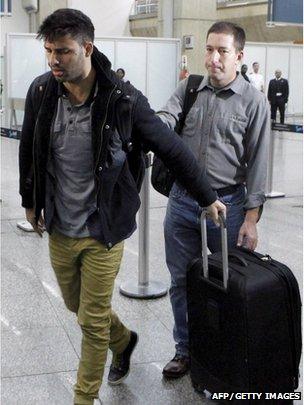David Miranda row: Seized files 'endanger agents'
- Published

David Miranda (left) is the partner of Guardian journalist Glenn Greenwald (right)
Details in files seized from Guardian journalist Glenn Greenwald's partner could risk intelligence officers' lives, a senior cabinet adviser says.
Deputy national security adviser Oliver Robbins said one file seized from David Miranda included 58,000 "highly classified UK intelligence documents".
Mr Miranda, who denies wrongdoing, was held for nine hours at Heathrow Airport under anti-terror laws on 18 August.
His lawyers said the government's claims were "sweeping and vague".
During Mr Miranda's detention, police seized a number of electronic items he was carrying, including a laptop, additional hard drive, and mobile phone.
Last week, High Court judges granted a temporary injunction that police examining the material seized at the airport would only be able to examine it for national security purposes.
The court was due to meet again to decide whether to extend the injunction.
'Piece of paper'
But, at the start of the hearing, Mr Miranda's lawyers said that he and other parties had reached an agreement that would allow police to carry on examining the material under similar conditions.
In a statement presented at the High Court, Mr Robbins said that the files Mr Miranda was carrying were "highly likely to describe techniques crucial in life saving counter-terrorist operations".
He added that intelligence staff were identifiable in the information, posing a danger to them in the UK and overseas.
Although many of the files were encrypted, Mr Robbins said, Mr Miranda was also carrying a "piece of paper containing basic instructions for accessing some data, together with a piece of paper that included the password for decrypting one of the encrypted files on the external hard drive".
"Work continues to access the content of the other files on the hard drive and the USB sticks," he added.
Mr Miranda's partner Glenn Greenwald has worked with former US intelligence contractor Edward Snowden on stories about US and UK surveillance programmes.
Mr Snowden fled the US in May after revealing extensive details of the workings of US intelligence agencies.
Reports based on data he had obtained accused the US National Security Agency (NSA) of gathering millions of telephone records, and collecting data from the systems of US internet giants including Google and Facebook under a previously undisclosed surveillance programme called Prism.
'Under threat'
Mr Miranda was detained for nine hours under schedule 7 of the Terrorism Act 2000 as he travelled from Berlin to Rio de Janeiro, where he lives with Mr Greenwald.
The law allows police to hold someone for up to nine hours for questioning about whether they have been involved with acts of terrorism.
But Mr Miranda plans to argue at a judicial review in October that his detention was a misuse of the powers.

Mr Snowden is wanted by US authorities, but has been granted temporary asylum in Russia
His lawyer Matthew Ryder said his client had been questioned and his property seized "under threat of criminal prosecution in a coercive use of schedule 7 which was unlawful".
But Mr Ryder said Mr Miranda had taken a "pragmatic approach" and accepted that the issues could be "better canvassed" during the judicial review process.
The Metropolitan Police said they were "pleased" by the agreement with Mr Miranda.
"The examination of this material is necessary for the purposes of an ongoing criminal investigation and to protect public safety," a spokesman said.
Scotland Yard also believes the detention of Mr Miranda at Heathrow was "legally and procedurally sound".
In a statement outside the court, Gwendolyn Morgan, also representing Mr Miranda, said the government's assessment of the seized material was "sweeping and vague".
- Published22 August 2013
- Published19 August 2013
- Published19 February 2014